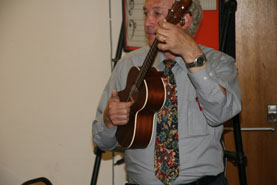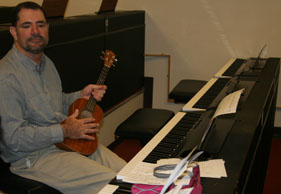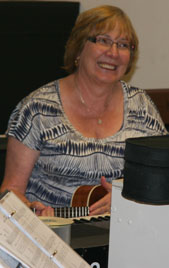
The sun sets upon the Pacific, kissing the golden beaches of the Big Island. The smell of salt water cannot overtake the alluring scent of barbeques, pepper and spice. As with the tide, sweet music ebbs and flows as a luau begins. It is a perfect Hawaiian evening.
There is a graceful silhouette pressed against the maroon sky. Torch-fire brings her into the light. A garland of lei adorns her shoulders and she wears a loose skirt of dried hibiscus. Her hips sway to the rhythm of the music. The tired sun now sets below the Pacific behind her. Sweet laughter and light music is heard while good-natured and pleasant folk garbed in their floral-print shirts sip margaritas and pina-coladas. The music is still smooth and the band plays on. Several fingers dance across four strings. No matter how many hours pass by, the night remains young and the light sound of the ukulele rings softly in the ear.
When I posed the question “What do you think of the ukulele?” to many Yuba College students, too often I was met with, “What the hell is a ukulele?” Twelve times, actually—word for word with only slight variation and, sometimes, much more colorful language.
This disturbed me greatly. After all, I thought it completely reasonable that such a diverse and multicultural student body at Yuba College converging in a small northern California town would know about one of Hawaii’s beloved treasures. I was totally offended. Really. How dare these Yuba College students be ignorant of the glorious ukulele?! After all, I had known about the ukulele for ONE WHOLE DAY before embarking on this report. Such gall, eh?

In actuality, the ukulele is not indigenous to Hawaii. In the late 19th century, Portuguese sugar-cane farmers arrived in Honolulu. Folklore recounts that day when the farmers, in celebration of making good time for such a long journey, presented their braguinhas and cavaquinos (both are four-stringed guitars) and began to jam. The native Hawaiians must’ve thought the performance was pretty bitchin’, because they were so impressed with the fretting style that they dubbed the instrument the “jumping flea,” or rather, the ukulele. However, this is only one of many stories regarding the origins of the ukulele’s name.
Dr. Robert Mathews, our very own music theory professor, spoke affectionately about the uke. “The ukulele is a fun instrument,” he said, “It’s easy to pick up and play.” Marc Flacks, our professor of sociology likened the uke as “the peoples’ instrument.” It’s a non-intimidating instrument, he added. However, student Jake Houshmand wasn’t too impressed. “You can’t shred on a ukulele,” he scoffed. Michael, a very avid fan of the classic video game Megaman said, “They’re cool. I don’t have any musical skill, but I think they’re cool.”

Despite the perceived popularity of ukuleles, they may only cater to a niche group. Only three companies manufacture professionally made ukuleles today. There are many different shapes and sizes though, and some ukes even have more than four strings. Even electric ukuleles are in production!
Like all topics though, a quick YouTube search reveals, as editor Bob Barton calls it, “a veritable plethora” of videos showcasing the skills of ukulele players. Michael may even find uke players performing the theme songs for bosses featured in Megaman games. But by far the most popular ukulele video is Jake Shimbabukro’s uke-inspired cover of the Beatles’ “While My Guitar Gently Weeps.” Over 12-million people have viewed it!
However you may feel about the ukulele, a hands-on experience is always the best way to learn something new and exciting. Of course, there is no time like the present. Every second and fourth Monday of the month, our campus is holding an event called “Yubaleles,” where the instrument is played for its own sake. If, by chance, you don’t have a ukulele, you are certainly encouraged to contact Robert Mathews and he will help you purchase one; and you too may throw your very own luau.
Note: This article was featured in the Prospector Fall 2013 print edition.
I come from a long line of yokels, mostly fishermen and truckers. Some then, find it odd that I am an aspiring economist and sociologist. The way I see it: my family’s tales of the road and the river humbled me, yet caused a thirst for adventure . I also like to write feature stories about interesting places and the beautiful people that live there. Like Yuba-Sutter.
Comment Policy: Comments are welcomed and encouraged. However, the editorial board reserves the right to edit or delete, without notice, any comments submitted to the blog. For more details, see our full Comment Policy.